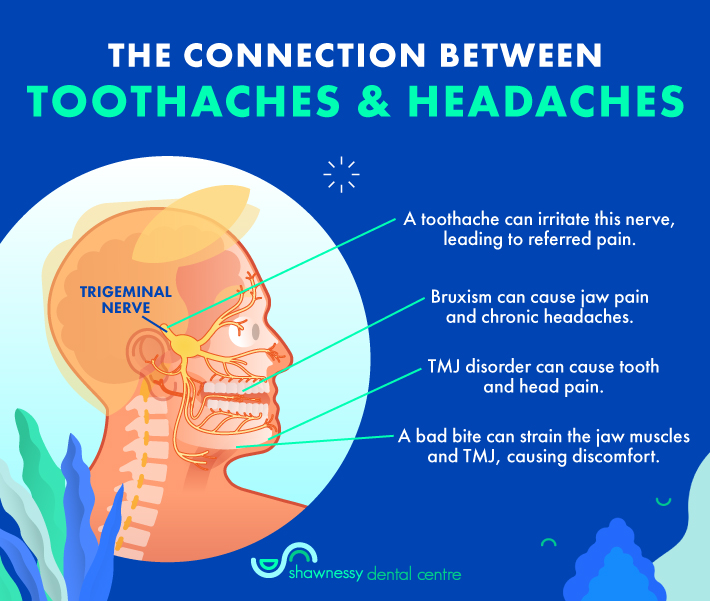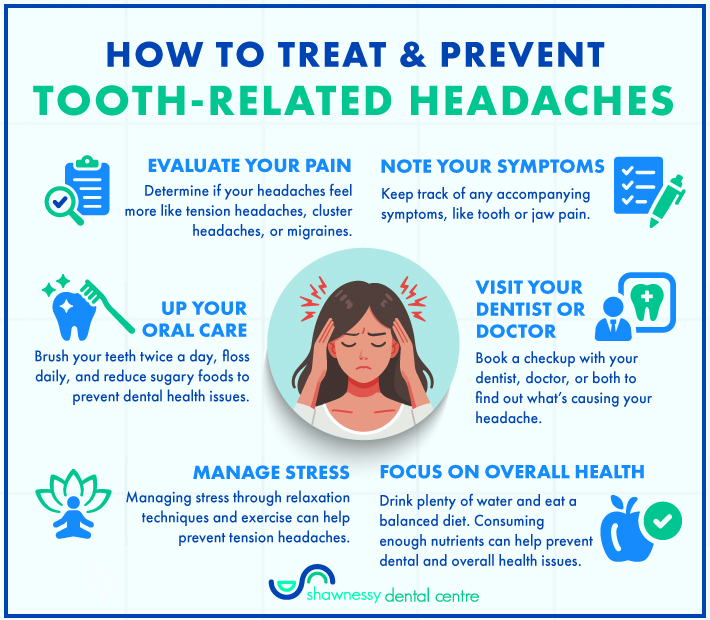Ever wondered why a toothache sometimes feels like it’s taking over your entire head? You’re not alone. The relationship between dental health and overall well-being is closer than most people realize.
A toothache can indeed cause a headache. This can be due to referred pain, temporomandibular joint (TMJ) disorder, teeth grinding, and a series of other things.
If you’re unsure of the source of your pain, contact your dentist for a checkup. They can help determine if tooth pain is contributing to your headaches and help set you on the path to relief.
What Is a Toothache?
A toothache is more than just a minor nuisance; it’s your body’s way of signaling that something is wrong. Toothaches can stem from various causes, like cavities, gum disease, dental infections, or even a cracked tooth.
Recognizing the symptoms early can help you seek timely dental care and avoid complications. Common symptoms of a toothache include:
- Sharp or throbbing pain
- Sensitivity to hot or cold foods
- Swelling around the tooth
- Persistent bad taste in your mouth
If you experience any of these symptoms, it’s crucial to consult a dental professional. Ignoring a toothache can lead to severe complications like abscesses, which can spread infection to other parts of your body.
Understanding Headaches & Their Causes
There are multiple types of headaches, each with its own set of causes and symptoms. Understanding these can help you identify what might trigger your discomfort and how to manage it effectively.
Tension headaches are the most common type, often caused by stress, poor posture, or muscle tension. Migraines are another severe form, characterized by intense, throbbing pain often accompanied by nausea and sensitivity to light and sound. Cluster headaches are less common but extremely painful, usually occurring in cyclical patterns.

The Relationship Between Toothache & Headache
The connection between toothaches and headaches lies in the complex network of nerves and blood vessels in your head and mouth. Referred pain is a phenomenon where pain experienced in one part of the body is perceived in another. This is particularly relevant when discussing toothaches and headaches.
The trigeminal nerve, the largest nerve responsible for facial sensations, plays a significant role in this connection. A toothache can irritate this nerve, leading to referred pain that manifests as a headache. Additionally, conditions like TMJ disorder can cause both tooth and head pain, further complicating the issue.
Tooth Grinding & Headaches
Tooth grinding, also known as bruxism, is another significant factor that can contribute to headaches. Bruxism often occurs unconsciously during sleep or periods of high stress, leading to excessive force being exerted on the teeth and jaw muscles. Over time, this can result in tooth damage, jaw pain, and even chronic headaches.
The repeated clenching and grinding of teeth can strain the TMJ and surrounding muscles, triggering tension headaches or migraines. The temporomandibular joint connects the jaw to the skull, and any dysfunction in this area can lead to a cascade of symptoms, including severe headaches, earaches, and facial pain.
Recognizing the signs of bruxism is crucial for alleviating associated headaches. Common indicators include:
- Waking up with a sore jaw
- Frequent ear pain
- Noticeable wear patterns on the teeth
Can Tooth Misalignment Cause Headaches?
An improper alignment of your teeth, commonly referred to as a “bad bite” or malocclusion, can indeed be a surprising source of headaches.
When teeth do not align properly, uneven forces are applied during chewing. This imbalance can strain the jaw muscles and the TMJ, causing discomfort and tension headaches or migraines.
Symptoms of a bad bite include:
- jaw pain
- difficulty chewing
- worn or chipped teeth
Treatment options such as braces, Invisalign, or orthodontic surgery can realign your bite, alleviate headache symptoms, and improve your oral health.

Prevention Tips
Maintaining good dental health can significantly reduce the risk of toothaches and associated headaches. Simple steps like brushing twice daily, flossing regularly, and using mouthwash can go a long way in keeping dental problems at bay.
Regular dental checkups are crucial for early detection and treatment of potential issues. Your dentist can provide professional cleanings and advice tailored to your specific needs. Additionally, managing stress through relaxation techniques and exercise can help prevent tension headaches.
Diet also plays a significant role in dental and overall health. Consuming a balanced diet rich in vitamins and minerals can strengthen your teeth and improve your general well-being. Avoiding sugary foods and drinks can prevent cavities and other dental issues.
Find the Source of Your Toothache
The relationship between toothaches and headaches is complex but significant. Understanding the connection can help you seek appropriate treatment and take preventive measures to maintain dental and overall health.
If you experience severe tooth pain that doesn’t go away, consult a dentist. Similarly, if your headaches are frequent and debilitating, visit a healthcare provider. Dental professionals and healthcare providers have the expertise and tools to diagnose and treat your condition accurately.
For personalized advice and treatment, book an appointment with Shawnessy Dental Centre. Our team is here to help you achieve better oral health and comfort.


